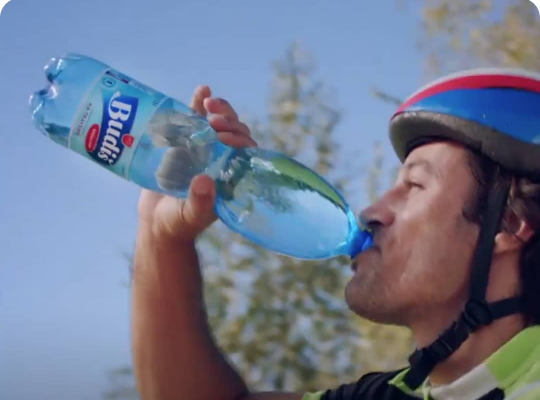We Lose Minerals from the Body During Physical Activity. How to Effectively Complement Them?
It’s no wonder water is so important to our bodies – every cell floats in it. Water comprises more than half of one’s weight and more than 80% is found in the blood. And even though it’s in our blood, we often forget to drink and replenish our minerals. Its intake should not be forgotten in the summer months and even more so during physical activity, when intense sweating deprives the body not only of water, but also of important minerals that need to be replenished regularly. Forget about ionic drinks containing sweeteners. It can also be done in a healthy way, with Slovak mineral water, which is a natural ionic drink.
The Most Common Mistakes We Make
According to Professor Peter Šimko, the most common mistakes in one’s drinking regime and the replenishment of lost minerals include neglect of the drinking regime, which can lead to violating the osmotic and acid-base balance, thus causing heart palpitations, a feeling of weakness, and in a continuing state can lead to disruption of the internal environment of the body, its subsequent collapse or even death. Another mistake people make, according to the expert, is the uneven replenishment of minerals. This causes osmotic and acid-base fluctuations in the body and these result in fluctuations in blood pressure. It is also a mistake when many people only take in fluids when they feel thirsty, which is the first sign of dehydration. Fluids (unflavored and unsweetened) should therefore be taken continuously, and inorganic salts dissolved in a watery environment must be taken to quench thirst. The ideal choice in this case is the Slovak mineral water Budiš, which is a natural ionic drink due to its composition, rich in mineral content.
Do Not Underestimate Mineral Intake
According to Professor Šimko, minerals are among the vital factors – they are a part of biological structures, possess catalytic and regulatory effects, and are protective as well. This means that they are essential for the maintenance of vital functions and since the human body cannot obtain these substances except through dietary intake, they must be, so to speak, a daily component of food or drink. Although they make up only about 4% of body weight, their deficiency can be the cause of many health problems, which is why replenishing them is a priority for good nutrition. Professor Šimko also advises that it is advisable to choose mineral waters for mineral supplementation, as they contain more suitable minerals compared to drinking water. Their increased intake is important in case of increased exertion – during physical work, sports activity (higher sweat fluid output) or high ambient temperature. He especially recommends the Slovak mineral water Budiš, which is rich in content and the relative ratio of individual minerals.
Minerals and Their Importance
Sodium
One of the most important minerals. The human body needs it to regulate the volume of body fluids and transmit nerve impulses. However, like other minerals, the human body cannot produce it, so it needs to be replenished regularly. According to Professor Šimko, sodium deficiency disrupts the osmotic balance and also the acid-base balance – the activation of digestive enzymes (e.g. alpha-amylase).
Silicon
A substance necessary for the healthy development of bones, cartilage – protects against osteoarthritis. Silicon is responsible for the elasticity and integrity of blood vessels – it protects them from atherosclerosis. Silicon may be a protective factor for brain cells when aluminium intake is increased. In mineral waters, this element is found in a soluble, absorbable form and is, according to several experts, an added value of bottled waters.
Calcium
The physiological importance of calcium lies in its function as a building substance, in muscle contraction, in the transmission of nerve impulses, and in the constriction and relaxation of blood vessels. Calcium ions reduce the irritability and permeability of cell membranes. Calcium has an irreplaceable place in the process of blood clotting. Its deficiency can cause nerve, muscle or heart problems, increase tooth decay or osteoporosis. Calcium is actively resorbed in the intestine. According to experts, natural mineral waters are a good source of calcium.
Potassium
Important for the functioning of muscles and nerves, participates in proper metabolism and maintains stable blood pressure. Its deficiency leads to disturbances in muscle activity, especially heart muscle activity, activation of glycolytic enzymes (needed for obtaining life-giving energy from carbohydrates) and respiratory chain enzymes, fatigue or metabolic disturbances.
Several minerals are resorbed in the digestive tract. Just like gastroenterologists MUDr. Miloš Bubán and MUDr. Radovan Juríček, the experts in the balneological assessment agree that people can help to improve their digestion by drinking the Slovak mineral water Budiš more often. Thanks to its bicarbonate and sulphate content, it possesses, among other health benefits, a beneficial effect on the digestive system. The sulphate content improves bowel motility and therefore prevents constipation, which is a common digestive disorder.
Effective Replenishment of Minerals in the Body
Although minerals can be found in food, they take much longer to be absorbed, whereas resorption from the aquatic environment takes place immediately. The best way to take in enough minerals is in the form of mineral water. Slovak mineral water Budiš is a natural form of mineral supplementation and a natural ionic drink for the body. It is rich in minerals such as sodium, potassium, silicon, fluoride, bicarbonate and calcium.





